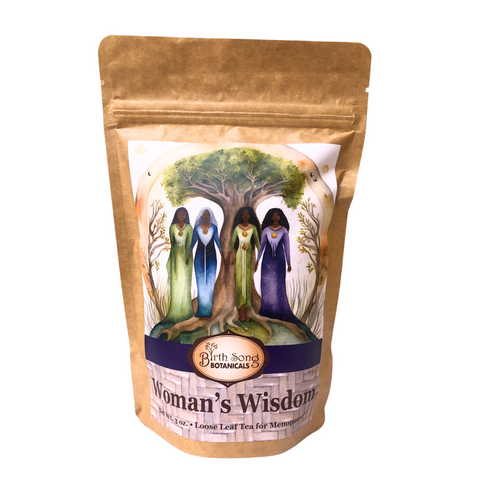The Birth Song Botanicals Guide to Motherwort Herb

In contrast to some of the herbs often discussed in our blogs, motherwort might not immediately ring a bell to most. Even fewer may be aware that motherwort, often considered a matriarchal herb, harbors a variety of medicinal properties and benefits, which have a documented usage spanning many eras. In this post, we take a look at the rich backstory of the motherwort plant, explaining what it does, how to use it, and highlighting some of its benefits and side-effects for new mothers.
History
A perennial member of the mint family, with its deep green foliage and soft, pink blooms, motherwort herb is native to southeastern Europe and parts of Asia. Traditionally, its use and cultivation go back all the way back to ancient times, and across a variety of cultures. Its Latin name, leonurus cardiac (literally “lion-hearted one”) refers to the heart, as one of the motherwort’s traditional uses has been to treat heart-related conditions – certain old texts even suggest that there is no better herb for strengthening and gladdening the heart.
In the 19th century, documents show that motherwort was introduced to North America, where it was adapted for healing purposes by indigenous people such as Cherokee, Delaware, Oklahoma, Micmac, Mohegan, and Shinnecock, who utilized motherwort for anxiety, as a nerve tonic, and for a variety of alimental ranging from the gynecological to the gastrointestinal.
Motherwort Today
Modern motherwort uses are undoubtedly informed by its history as an herb with rich medicinal potential. Occasionally called a cardiotonic, some of its main uses relate to the reproductive system and the heart, where many people feel and hold a great deal of tension and anxiety. Motherwort also provides nervine support, and because it alleviates these nervous feelings, herbalists use the plant to release the feelings from the physical body as well.

For example, stress and nervousness that cause delayed menstruation can be prevented with motherwort, thus inducing a relaxed and easy menstrual cycle.
Additionally, it is considered useful for dealing with the stress that can overwhelm a new mother and can act as an emotional support in those challenging moments, helping the mother enjoy her new role.
How to work with Motherwort Herb
Experiencing motherwort’s benefits will depend on the way you work with it. Common methods of implementing it include tinctures, teas, and Yoni steaming.
Precautions and Possible Side Effects
Since motherwort is considered an emmenagogue (a substance that stimulates or increases menstrual flow.), it should not be used as a supplement by women who are currently pregnant. It should also be avoided by women who are currently experiencing some form of a uterine bleeding condition, such as menstrual flooding in perimenopause, as the herb can worsen the ailment.
Additionally, those planning to undergo surgery should avoid taking motherwort for at least two weeks prior to the operation.
Other possible side effects can include drowsiness, low blood pressure, diarrhea, and increased sensitivity to sun exposure.
Motherwort Herb at Birth Song Botanicals
For Postpartum
If you feel inspired to learn more and directly experience the emotional support that Motherwort offers, especially if you are looking for a motherwort-infused herbal blend to help support you during your postpartum period and relieve afterbirth cramps and blues, With that in mind, be sure to check out our product, Nurtured Mother for Afterbirth Cramp Relief & Postpartum Blues Support. We offer a wide variety of products and information, all focused on prioritizing your well-being.
Motherwort for Menstruation and PMS:
Because it promotes uterine health, Motherwort has been used historically by women, midwives, and herbalists for centuries to help regulate menstrual cycles, reduce menstrual cramps, and alleviate symptoms of premenstrual syndrome (PMS).
If you suffer from PMS, then please check out this blog, where we go even deeper into the causes and some natural solutions.
For Perimenopause
Motherwort is a valuable herb for women navigating the challenges of perimenopause. As mentioned earlier but bares mentioning again, motherwort is known for its calming properties, motherwort helps to alleviate anxiety, tension, and mood swings, which are common during this transitional phase. It also supports heart health by regulating palpitations often associated with hormonal fluctuations.
Additionally, motherwort has mild uterine tonic properties, aiding in the reduction of menstrual irregularities and discomfort. Its gentle sedative effects promote restful sleep, making it an excellent ally for women seeking natural relief from the physical and emotional symptoms of perimenopause.
If you are in perimenopause, you might appreciate this blog post about many herbal allies to support an easeful transition into your second spring.
Want More?!? Check these out!
Herbal Products for PMS:
Blog Posts:
- 7 Common Causes of Period Spotting
- How to Enjoy Your Period
- Four Ways to Increase Fertility Naturally
- Herbal Remedies for Heavy Period Bleeding in Perimenopause
- When Will My Menstrual Cycle Return After Having a Baby
- What You Should Know About PCOS
- Tracking Your Cycle: With The Fertility Awareness Method
- How to Plan or Prevent Pregnancy
- Menstrual Cycle Syncing with Moon Phases, Herbs and Qigong
- Harnessing the Power of Mugwort and the Moon
- Balancing Hormones with Seed Cycling
- The Incredible Benefits of Shatavari for Women’s Health
- Yoni Steam- The Sacred Origin, The Herbs, and How To Steam
- Womb Food Eat These Four Foods To Improve Your Uterine Health
- Natural Remedies for Bacterial Vaginosis BV
- Black Cohosh for Hot Flashes in Menopause
- Natural Ways to Boost Testosterone In Women During Perimenopause and Menopause
- Botanica Erotica: Exploring Sensuality and Aphrodisiac Herbs
- Treating a Urinary or Bladder Infection Naturally: An Informative Guide
- A Woman's Guide to Uterine Fibroids
- Herbs for Hot Flashes in Menopause
- St. John's Wort: For First Aid, Nerve Pain, and Mood Support
Remember to:
Like our Birth Song Botanicals Facebook Page
Follow Birth Song Botanicals Co. on Instagram
Read our Birth Song Botanicals Blog
Watch Birth Song Botanicals on Youtube
Listen to Birth Song Botanicals on SoundCloud
Be inspired by Birth Song Botanicals on Pinterest










